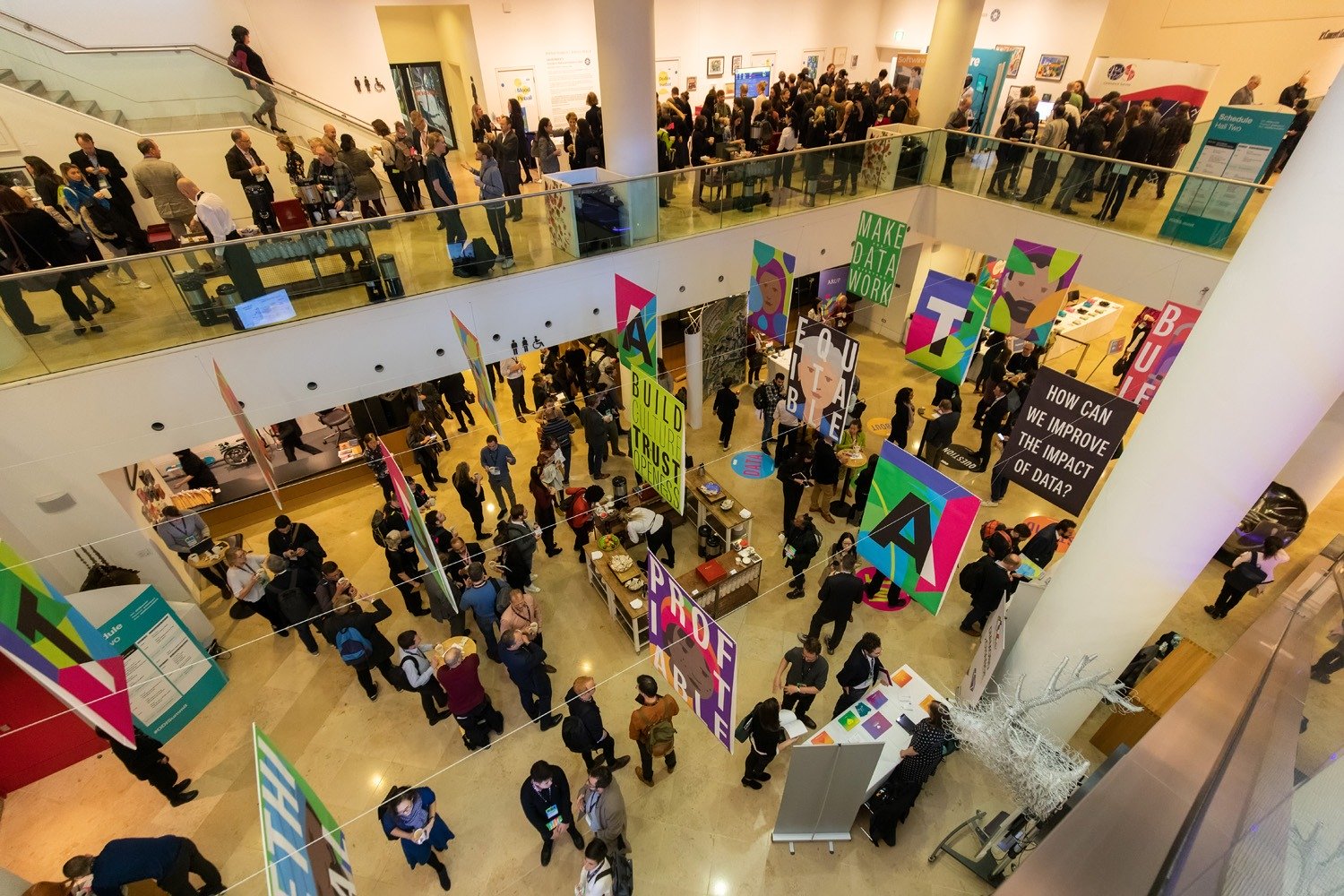Highlights
- Digital download
- Tax reconciliation (the multilateral kind)
- Murky finance
- Another kind of dirty business
- Civic space captured?
- TAI Spotlight: Watching over the bright lines of democracy
In case you missed it…
You can read the TAI Weekly in translated versions! Simply click the “Translate” button located at the top right-hand corner when you view the newsletter directly on Mailchimp via “Read More” links below.

Image: Open Data Institute via Twitter
Digital download
The Pathways for Prosperity Commission’s Digital Roadmap came out with some fanfare this past week, culminating two years of research and engagement looking at how lower-income countries can harness new technologies to deliver development for all citizens, not just the privileged few. Melinda Gates offered her take as did the Commission’s Executive Director Elizabeth Stuart, emphasizing how many of the recommendations are political in nature; governments and citizens alike will need to be savvy to realize the benefits of digitalization. Much to mull over in those recommendations. The need to “translate” data for citizens (#6) will be familiar to transparency and accountability folk (see more under TAI Spotlight), as will the call for investment in digital platforms “to involve citizens in decision-making” (#7) although the track record on that front might give us pause. Little controversy on #8 that “All governments need to establish a data governance regime.”
Want more on data for development? Join Development Gateway at the upcoming DataRev conference. Need a conversation starter as you network? Check out this note from the just-concluded Open Data Institute (ODI) Summit 2019 to drive conversation on our future with data. Going further in their tech imaginings, Yasodara Cordova and Eduardo Vicente Goncalves make a case for how Robots and AI can be used for the greater public good.
Returning to the data governance concern, Kenyans celebrate the passage of their data protection law, while Subhashish Bhadra and Roopa Kudva of Omidyar Network India warn businesses to take data privacy seriously. Stephanie Hare says the General Data Protection Regulation laws are not protecting our privacy or our children’s.
Perhaps no surprise then that RadicalxChange’s Glen Weyl thinks it is time for us to demand for “a society that treats people as agents of their own privacy rather than passive subjects in a surveillance state.” A recommendation that might resonate with panelists at this year’s Trust Conference, including Luminate’s (TAI member) Martin Tisne, reinforcing the case that there is no such thing as a private data. Why? Our friend’s data may include information on our own data.
Tax reconciliation (the multilateral kind)
As the Pathways for Prosperity Commissioners see an inevitable uptake of digital services, tax authorities are still catching up to private sector providers already making huge fortunes. The Dominican Republic joins the long list of countries considering a new tax regime on digital services. India and 28 other countries are already taking steps to make sure their interests are not overlooked as they oppose the new global rules for taxing tech giants. Their discontent? They believe the proposal gives undue taxation rights to the US at their expense. José Antonio Ocampo, President of the Independent Commission for the Reform of International Corporate Taxation, believes the OECD digital tax’s proposals are neither ambitious nor fair enough.
Naomi Fowler would agree and argues that if the UN is allowed to set tax rules there is a greater chance of a regime that recovers more corporate taxes currently lost to abuse. How to spend those funds? We talk a lot of harnessing revenues in support of the Sustainable Development Goals, but more immediately for the UN, the organization is running out of money and risks insolvency as certain members, chiefly the US, fail to pay their dues. Alex Cobham notes that the sums involved equate to less than .05% of the $500bn lost to corporate tax avoidance each year.
Wondering how governments can increase tax compliance at a more local level? Read how Kaduna state in Nigeria was able to improve tax compliance through facilitation and trust building.
Finally, the European Union (EU) Council delisted Belize as a tax haven country. Additionally, the EU Council reached a number of agreements including to simplify VAT payment rules and data protection.
Essential watching
The Auditor General of South Africa offers encouragement to social audits as a tool to reinforce accountability over municipal level budgeting and performance.
Murky finance

Nate Sibley and Ben Judah are looking to close the financial secrecy loopholes that allow authoritarian regimes to interfere with Western politics and offer a roadmap on how Western nations can fight back against weaponized finance.
One of the vehicles for interference are anonymous shell companies. Interesting to see Xiangmin Liu, president of the Financial Action Task Force (FATF), go on the attack against them this past week. It will also be interesting to see if that leads to adoption of recommendations to strengthen beneficial ownership transparency in the FATF standard. Sean Martin McDonald as well reminds us of the importance knowing the actual benefactor of a company’s ownership. Perhaps this will inspire Nigeria’s President Buhari to finally sign the Companies and Allied Matters Act that has been awaiting his penmanship for six months and once enacted will require beneficial ownership disclosure and could save up to $15bn per year.
Another area ripe for abuse is the sale of state assets. Governments, rich and poor alike, have been notoriously bad at assessing what properties and equipment are really worth, often selling off for less than true value. Now three years of experimentation in Ukraine offer insights into a better way. Many will know of the country’s ProZorro transparent public procurement system. You may not be so familiar with ProZoro.Sale that extends the transparency approach to an online auction system for selling and leasing items previously thought inefficient to trade. Sophie Brown details the system and its impact including adding over US$870m to Ukraine budgets.
Perhaps too late to inspire neighboring Moldova where despite the EU’s reliance on civil society on keeping the government accountable, the Moldovan government collapsed following a vote of no confidence in parliament over anti-corruption reforms.
Another kind of dirty business
The Climate Accountability Institute has identified those 20 companies most responsible for carbon emissions – in fact responsible for a third of all emissions since 1965. No surprise they are all extractives firms. It’s too late to reverse those impacts, but now could be the time for more scrutiny in firms’ reporting of current/future emissions.
Central bankers seem to be willing to get more proactive, given the fiscal implications of climate change. Sweden’s central bank recently sold off bonds from Alberta and some from Australia because their carbon emissions are too high.
Civic space captured?

Perhaps some surprise that climate change does not feature in the vision for the Open Government Partnership in 2019-20 as laid out by the new co-Chairs, but digital governance is there along with a focus on people-centered justice, and the need to strengthen civic space. On this last point, the OECD has launched a new Observatory on Civic Space to monitor developments and support citizen engagement with governments. It will be interesting to see how their future global report will compare to the likes of the Civicus Monitor and which countries will agree to volunteer for more in depth country scans.
In the meantime, much for the new OECD team to start monitoring worldwide. Little of it encouraging. New Mongolian legislature threatens to constrain civil society in the country with provisions in the law from Russia and Hungary. In Lebanon, the Gulf Centre for Human Rights highlights the urgent need to protect the rights of women in Lebanon advocating for progress in the protest arena. UNDP highlights shrinking civic space in Eurasia noting six major human rights problems in the region.
In Nigeria, Dominic Ayegba Okoliko worries that dynamics that enabled state capture are now being protected by deliberate “civic space capture”. Meanwhile, the country’s senate recommends the establishment of an agency to check hate speech in the country and senators propose a bill with severe penalties, even the death penalty, for those convicted of hate speech, worrying those who fear its abuse.
TAI Spotlight: Watching over the bright lines of democracy
Exploring Barriers to Data Use in Colombia’s Mining Sector – Transparency and Accountability Initiative (TAI)
In 2019, TAI teamed up with International Finance Corporation’s (IFC) Disclosure to Development (D2D) program and Global Integrity to assess gaps and challenges in the publication and use of royalties data in Colombia, and to surface potential solutions to tackle them. Find out what we learnt and what’s next on this project.
Watching over the bright lines of democracy – Hewlett Foundation
Daniel Stid, Director of the Madison Initiative at the William and Flora Hewlett Foundation headlines some key results from the Bright Line Watch project which has been monitoring and using data to watch over democratic principles of the United States democracy.
Support for African Cultural Heritage Restitution – Open Society Foundations
The Foundation announced a $15 million initiative to strengthen efforts to restore cultural objects looted from the African continent. According to Open Society President, Patrick Gaspard, “This isn’t just about returning pieces of art, but about restoring the very essence of these cultures.”
Understanding the Organizational Needs of Grantees – Ford Foundation
Karim Babouder-Matta, Program Associate of Building Institutions and Networks (BUILD), explains what the Foundation is learning about the organizational development priorities of its grantee partners with the use of the Organizational Mapping Tool (OMT). The tool is available as an open resource in seven languages.
Calls and job listings
Project Manager, The Henry J. Leir Institute – The Fletcher School – Ongoing
Co-Impact Director of Programs and Learning – Ongoing
Managing Director of Programs and Learning – Ongoing
Democracy Fund: Sr. Associate, Strategy & Learning – Ongoing
Mawazo Institute fellowship (for women pursuing PhDs at universities in East Africa) — November 22, 2019
Small Charities Challenge Fund for UK registered NGOs and Charities – November 28, 2019
Technology for Integrity: US-Russia Anti-corruption Exchange – November 30, 2019
WinterSchool for Thinktankers 2020 – December 1, 2019
TAI Photo Grant – January 13, 2020
Calendar
Global Partnership for Social Accountability – Global Partners Forum 2019 – November 19-21, 2019 (Washington DC, United States)
DataRev 2019: Using Data to Improve Lives – November 20-22, 2019 (Washington DC, United States)
Storytelling and the future of advocacy in the 21st century – November 21, 2019 (Washington DC, United States)
Association for Research on Nonprofit Organizations and Voluntary Actions (ARNOVA) conference – November 21-23, 2019 (California, United States)
Holding Foreign Leaders Accountable for Corruption: Considering Innovative Legal Approaches –November 25, 2019 (New York, United States)
Healing Solidarity: Embodying Change is a free online conference about Re-imagining International Development – November 25-29, 2019 (virtual/online)
The Story Conference – November 27 – 29, 2019 (Melbourne, Australia)
The Impacts of Civic Tech Conference (TICTeC) – March 24 – 25, 2020 (Reykjavik, Iceland)
Transparency International: 19th International Anti-Corruption Conference – June 2 – 5, 2020 (Seoul, South Korea)
Women and Girls Africa Summit – June 9-12, 2020 (Durban, South Africa)
Amartya Sen Essay Contest 2020: Illicit financial flows – August 31, 2020


